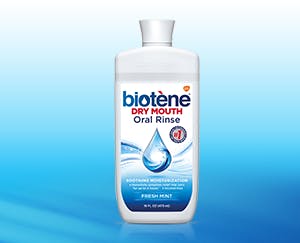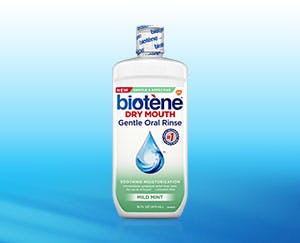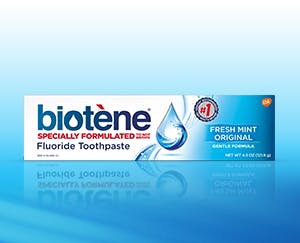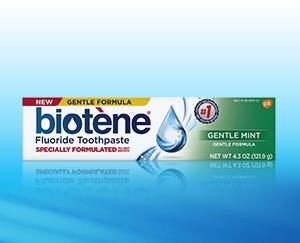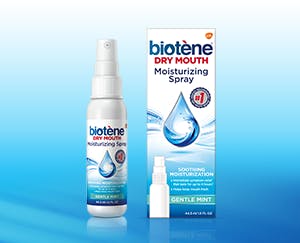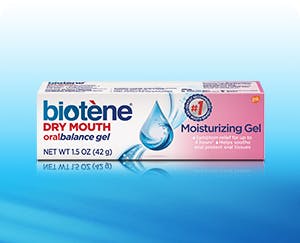Dry mouth is an uncomfortable sensation that happens when your salivary glands aren’t producing enough saliva to keep your mouth wet. Dry mouth can be a side effect of taking certain medications or aging issues.1 If you’re looking for relief from your dry mouth, try one or more of the following natural remedies and treatments:2,3
- Try sugarless gum, candy or lozenges. Holding or chewing something in your mouth can be a natural way to increase saliva production. Look for ones with hydrating agents such as aloe, xylitol or glycerin.
- Increase your water intake. Sipping water can bring some temporary relief from the sticky or dry feeling you’re experiencing in your mouth.
- Try using a moisturizing, alcohol-free mouthwash. Alcohol can dry out your mouth and exacerbate the problem. Try a mouthwash that’s formulated for dry mouth to help ease your symptoms.
- Avoid caffeine and alcohol products as they can add to dryness and can cause an increase or excessive release of bodily fluids.
- Breathe through your nose instead of your mouth. Check with your physician or dentist if breathing through your nose is a problem.
- Quit smoking. Smoking or chewing tobacco is a common cause of dry mouth.
- Try a dry mouth moisturizing spray. A spray with moisturizing agents could be a great way to help get relief from your dry mouth throughout the day.
- Try to avoid using over-the-counter antihistamines and decongestants that could make your symptoms worse. Check with your healthcare professional regarding use of these types of products.
- Add a humidifier to your room. Using a humidifier throughout the day, especially while you’re sleeping, can help ease your dry mouth as it increases the moisture in the air.
- Try eating more moisturizing foods. Snacking on some celery can add moisture to your mouth and can help stimulate saliva flow. You can also try moistening hard, dry foods using condiments, soups, gravies and sauces.
- Eat papaya. The digestive enzymes in papaya can help stimulate the production of saliva.
- Practice good oral hygiene, like brushing twice daily, to help keep your mouth healthy.
- Avoid sugary or acidic foods and drinks that could impact your oral health.
Be sure to check with your dental or medical professional team to confirm which treatments would be suitable for you.
What Causes Dry Mouth?
Dry mouth occurs when you don’t produce enough saliva to keep your mouth feeling moist and comfortable. This can be caused by the following:1
- Medications. Many different types of prescription and over-the-counter medications list dry mouth as one of their side effects. Drugs that treat depression, high blood pressure and anxiety, as well as antihistamines, decongestants, muscle relaxants and pain medications, can all contribute to dry mouth.
- Aging. Many people experience dry mouth as they age. This can be caused by several different factors, including changes in the way your body processes medications and dietary changes.
- Tobacco and alcohol use. Drinking alcohol and smoking or chewing tobacco can increase dry mouth symptoms.
- Cancer therapy. Chemotherapy can temporarily alter the feeling of your saliva and the amount your body produces. Head and neck radiation can decrease saliva production for the long term by damaging the salivary glands.
- Underlying health conditions. Certain health conditions, such as diabetes, stroke, yeast infection (thrush) in your mouth, Alzheimer's disease and autoimmune diseases like HIV/AIDS, can cause dry mouth.
- Recreational or hard drug use. Methamphetamines can dry out your mouth and cause a condition known as "meth mouth." Smoking marijuana can also cause your mouth to feel dry.
- Nerve damage. A traumatic injury to your neck or head can cause dry mouth if it alters your salivary glands.
What Are the Symptoms of Dry Mouth?
Besides the obvious dry feeling in your mouth, there are other common symptoms of dry mouth, including:1
- Stickiness in your mouth
- Thick and stringy saliva
- Bad breath
- A dry or grooved tongue
- Dry or sore throat
- Changes in your sense of taste
- Problems wearing dentures
- Trouble chewing, speaking and swallowing
How to Prevent Dry Mouth with Biotène
Biotène products are specially designed for dry mouth sufferers and provide convenient, around-the-clock options that you can use throughout the day or night. Try our Moisturizing Gel, Moisturizing Mouthwash or Mouth Spray that lubricates your mouth and helps to provide long lasting relief from dryness. Practice good oral hygiene with Biotène toothpaste—a specially formulated toothpaste that helps strengthen teeth and protects against decay with a non-irritating formula. Combining these different products throughout the day can help your mouth stay moisturized on the go.
Source Citations:
- Dry mouth - Symptoms and causes. Mayo Clinic. https://www.mayoclinic.org/diseases-conditions/dry-mouth/symptoms-causes/syc-20356048. Accessed 3/18/22.
- Dry mouth treatment: Tips for controlling dry mouth. Mayo Clinic. https://www.mayoclinic.org/diseases-conditions/dry-mouth/expert-answers/dry-mouth/faq-20058424. Accessed 3/18/22.
- Dry Mouth Remedies: 14 to Try. Johns Hopkins Medicine. https://www.hopkinsmedicine.org/health/conditions-and-diseases/dry-mouth-remedies-14-to-try. Accessed 3/18/22.



